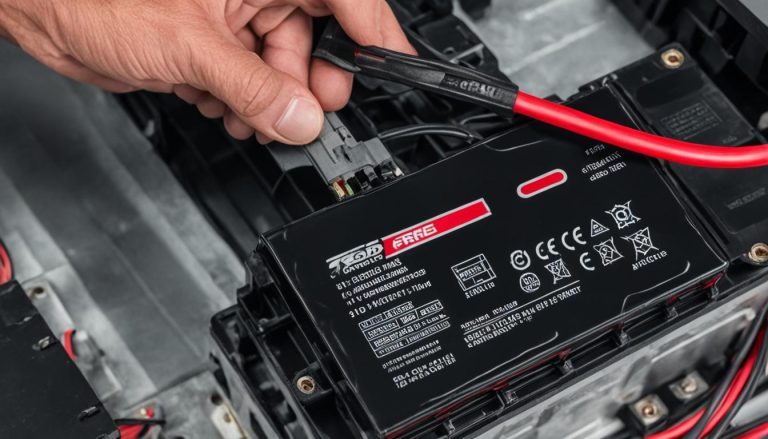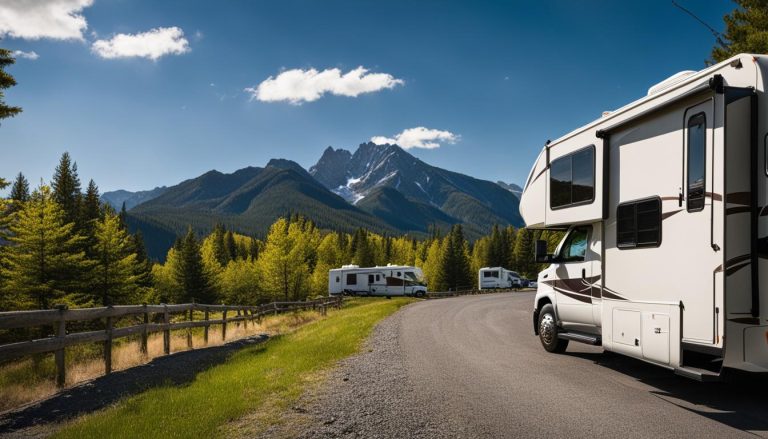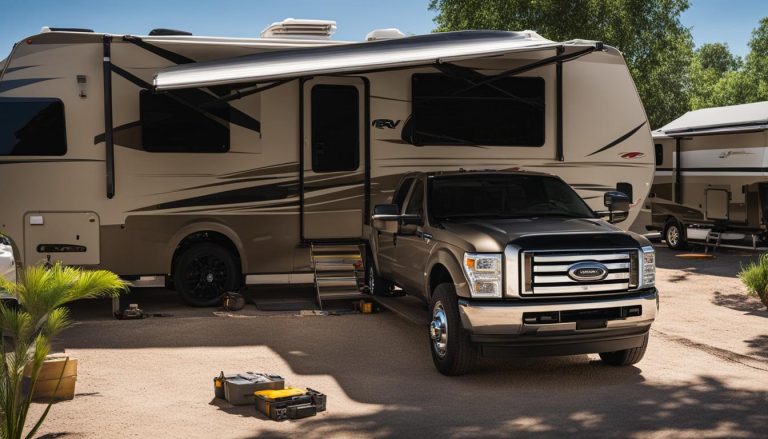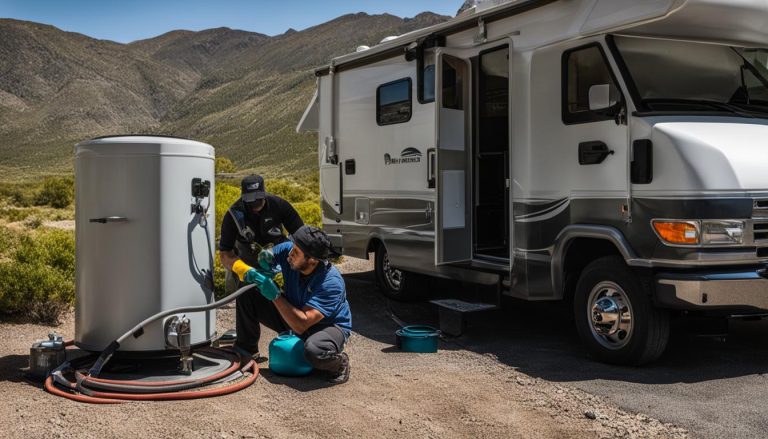Full-Time RV Living Prep – Embrace the Journey!
gorvlifestyle.com and its partners may earn a commission if you purchase a product through one of our links
Are you dreaming of a life on the open road, where the adventure awaits at every turn? Transitioning to full-time RV living can be an exciting and liberating experience, allowing you to explore new places, embrace a simpler lifestyle, and create unforgettable memories.
However, before you hit the road, it’s important to make some essential preparations. From choosing the right RV to downsizing your belongings, and from setting up a legal address to ensuring you have a reliable internet connection, there are several key steps to consider.
In this guide, we’ll walk you through the important preparations you need to make to embark on your full-time RV living journey. Whether you’re an empty nester seeking adventure or a digital nomad looking for the ultimate work-life balance, these tips will help you get ready for the RV lifestyle.
Key Takeaways:
- Research and choose the right RV for your needs and preferences.
- Downsize your belongings and embrace a minimalist lifestyle for RV living.
- Establish a plan for generating income while on the road.
- Set up a legal address for taxes, voting, and other legal considerations.
- Ensure you have a reliable internet connection for staying connected.
Choosing the Right RV for Full-Time Living
When it comes to embracing full-time RV living, choosing the right RV is essential. Consider various factors such as size, layout, and features to ensure the RV aligns with your family’s needs. With a wide range of RV types available, including fifth wheels, travel trailers, and Class B campervans, it’s important to understand their advantages and considerations.
If you’re torn between buying new or used, weigh the pros and cons. While a new RV may come with warranties and the latest features, it can be more expensive and subject to higher depreciation. On the other hand, buying a used RV can save you money, but it’s crucial to thoroughly inspect the vehicle for any potential issues.
Tips for Buying a Used RV
- Research the make and model to understand its reputation and common problems.
- Inspect the RV inside and out, checking for any signs of water damage, structural issues, or mechanical problems.
- Consider hiring a certified RV inspector to perform a detailed inspection prior to purchase.
- Ask for maintenance records and inquire about previous ownership and any accidents the RV may have been involved in.
- Take a thorough test drive to assess the RV’s performance on the road.
Furthermore, educating yourself about full-time RV living is crucial. Consider enrolling in a full-time RV living course to learn more about the lifestyle, best practices, and tips for a successful journey. These courses can provide valuable insights and help you navigate the challenges of living on the road.
By carefully choosing the right RV, whether new or used, and ensuring it meets your specific needs, you can embark on an exciting adventure of full-time RV living.
Downsizing and Minimizing for RV Living
When preparing for full-time RV living, downsizing and minimizing your belongings is a crucial step. Embracing a more minimalist lifestyle will not only help you declutter but also ensure that everything you bring with you has a purpose and will fit comfortably in your RV.
To start the downsizing process, be ruthless in your efforts to declutter. Begin with larger items and gradually reduce your possessions over time. Consider each item and ask yourself if it is truly essential for your RV life. If not, it may be time to part ways with it.
Here are some tips for downsizing:
- Start early: Begin the downsizing process well in advance of your move to give yourself enough time to sort through your belongings.
- Take inventory: Make a list of the items you absolutely need and prioritize them. This will help you stay focused during the downsizing process.
- Donate or sell: Consider donating or selling items that are in good condition but no longer serve a purpose for you. It can be a great way to give back to the community and earn some extra income.
- Digitize documents: Scan important documents and photos to reduce the amount of physical paperwork you need to carry with you.
- Maximize storage space: Invest in storage solutions that make the most of the available space in your RV, such as collapsible containers, hanging organizers, and under-bed storage.
While some RVers choose to use storage units for items they can’t part with, it’s important to weigh the cost and consider if it’s necessary for your situation. Storage units can be an additional expense and may not be easily accessible while on the road.
Establishing Income and Financial Considerations
When transitioning to full-time RV living, one of the most important factors to consider is how you’ll generate income on the road. There are various income options for RV living, and finding the right one for you can provide the financial stability needed to support your new lifestyle.
Working Remotely
One popular choice for earning income while living in an RV is working remotely. This allows you to continue your current job or explore remote job opportunities that provide the flexibility to travel. Talk to your employer about the possibility of negotiating a remote work arrangement, which could include working remotely full-time or part-time. Additionally, if you’re open to new job opportunities, there are various websites and platforms that connect remote workers with companies looking for remote employees.
Pro Tip: Update your resume to highlight your remote work experience and skills, as employers may value those who are experienced in working independently.
Starting an Online Business
Another option is to start your own online business. This could include creating and selling digital products, offering consulting services in your area of expertise, or even starting a blog or YouTube channel with the potential to generate income through advertising, sponsorships, and affiliate marketing. Starting an online business can provide the flexibility and freedom to work on your own terms while enjoying the RV lifestyle.
Budgeting for Full-Time RV Living
Proper budgeting is crucial for ensuring financial stability while living in an RV full-time. To create an effective budget, consider the costs associated with full-time RV living. This includes monthly campground fees, fuel expenses, regular maintenance and repairs, insurance, and daily expenses such as groceries and supplies. By tracking your spending and planning your budget accordingly, you can have a clear understanding of your financial situation and make informed decisions to help you stay within your means.
It’s also important to account for unexpected expenses and emergencies by setting aside an emergency fund. This will provide a safety net in case of unforeseen circumstances and help you avoid financial stress during your RV journey.
| Expenses | Estimated Monthly Cost |
|---|---|
| Campground Fees | $500 – $1,500 |
| Fuel | $300 – $600 |
| Maintenance and Repairs | $100 – $300 |
| Insurance | $100 – $200 |
| Groceries and Supplies | $400 – $800 |
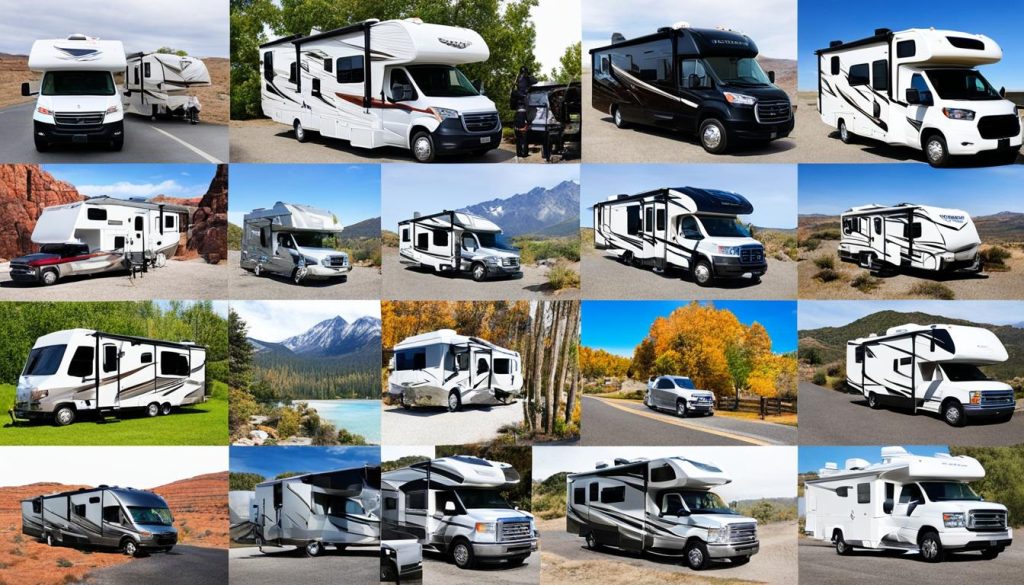
By establishing multiple income options and budgeting wisely, you can enjoy the freedom of full-time RV living while maintaining financial stability. Remember, each individual’s financial situation and goals may differ, so it’s essential to tailor your income and budgeting strategies to your specific needs and circumstances.
Setting Up a Legal Address and Mail Handling
Even as a full-time RVer, it’s important to have a legal address for various purposes, including taxes, voting, vehicle registration, and mail handling. Fortunately, there are several options available to establish a domicile address that meets your needs and legal requirements.
Choosing a Legal Address
You can establish a legal address for your RV by utilizing different methods:
- Using Your Own Property: If you own property, you can use it as your legal address. This provides a permanent and stable option for full-time RVers. However, it’s important to ensure that your chosen domicile state allows for a property to be used as a legal address.
- Moving in with a Family Member: Temporarily moving in with a family member who has a permanent residence can provide you with a legal address. This option allows you to maintain a connection to a specific state for legal and administrative purposes.
- Domicile Address Services: There are specialized services that cater to full-time RVers and provide domicile addresses. These services typically offer a legal address in a state with favorable tax laws and mail forwarding services. It’s crucial to research and choose a reputable service that complies with legal requirements.
Complying with Legal Requirements
Regardless of the method you choose, it’s important to research and comply with the legal requirements of your domicile state. This includes understanding tax obligations, vehicle registration regulations, and any other legal considerations specific to your chosen state. Consulting with legal professionals or experienced full-time RVers can provide valuable insights and guidance.
Mail Handling for RVers
Effective mail handling is essential for full-time RVers. While many people rely heavily on digital communication, some correspondence still requires physical mailing or delivery. Here are some mail handling options:
- Forwarding Services: There are services that specialize in mail forwarding for RVers. These services receive your mail at a designated address and forward it to you at your current location. They can also provide mail scanning and online access to view and manage your mail remotely.
- Family Member’s Residence: If you have a trusted family member or friend who is willing to assist, you can use their address as a mail handling option. They can collect your mail and forward it to you periodically or as needed.
When choosing a mail handling option, consider the frequency of your mail, the importance of timely delivery, and the level of convenience you require.
| Mail Handling Option | Pros | Cons |
|---|---|---|
| Forwarding Services | – Provides a dedicated service for mail handling – Offers mail scanning and online access – Can forward mail to any location |
– Additional cost for the service – Reliance on a third-party service – Limited control over the physical mail handling process |
| Family Member’s Residence | – Potentially no additional cost for forwarding – Personal connection and control over the process – Can coordinate mail forwarding as needed |
– Dependency on the availability and reliability of the family member or friend – Potential inconvenience for both parties involved |
Choosing the right mail handling option depends on your specific needs and preferences. Consider factors such as cost, convenience, security, and reliability when making your decision.
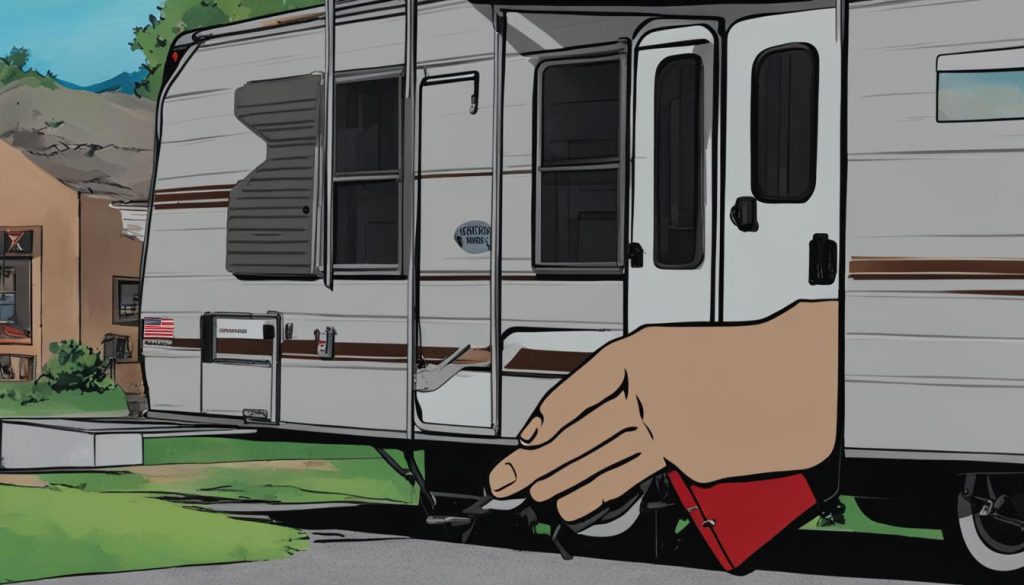
Internet Connectivity on the Road
In today’s digital age, staying connected while on the road is crucial for many full-time RVers. Researching and choosing the right internet connectivity options for your needs is important. This can include cellular data hotspots, satellite internet, or a combination of both. It’s important to consider coverage areas, speed, and reliability when selecting an internet solution for your RV. Keeping in touch with family and friends, as well as maintaining remote work or school connections, relies on having a reliable internet connection.
Staying connected in your RV opens up a world of possibilities. Whether you need to stay in touch with loved ones, stream your favorite movies and shows, or work remotely, having a reliable internet connection is essential. Here are some internet options for RVers:
- Cellular Data Hotspots: Many RVers rely on cellular data plans that offer mobile hotspot functionality. This allows you to connect your devices to the internet by utilizing the cellular network. It’s important to choose a provider with robust coverage in the areas you plan to travel. Keep in mind that data plans may have limitations on data usage and speeds may vary.
- Satellite Internet: Satellite internet is another option for RVers, especially for those who venture into remote areas with limited cellular coverage. Satellite internet relies on a dish to establish a connection with satellites orbiting the Earth. While it provides broader coverage, it can be more expensive and may have slower speeds compared to cellular data.
- Combination of Both: Some RVers opt for a combination of cellular data and satellite internet to ensure they have internet access in as many locations as possible. This can offer a balance between coverage, speed, and reliability.
When choosing an internet solution for your RV, it’s crucial to consider your specific needs and priorities. Do you require high-speed internet for work or streaming? Are you planning to travel in remote areas without reliable cellular coverage? Taking the time to research and compare different options will help you find the best internet solution for your RVing lifestyle.
Staying Connected on the Road: Tips and Tricks
Here are some additional tips to help you stay connected while traveling in your RV:
- Boosting Signal Strength: In areas with weak cellular signals, you can use a signal booster to amplify the signal and improve internet speeds.
- Utilizing Wi-Fi Extenders: Wi-Fi extenders can help you capture and extend Wi-Fi signals from campgrounds or other sources, providing you with a more reliable connection inside your RV.
- Managing Data Usage: Since many cellular data plans have limitations on data usage, it’s important to monitor and manage your data usage. Avoid excessive streaming or downloading large files to avoid exceeding your plan’s data cap.
By considering your internet needs, researching different options, and implementing these tips, you can ensure that you stay connected and have a reliable internet connection while on the road in your RV.
Maintenance and Repairs
As a full-time RVer, it’s important to stay on top of regular maintenance tasks and occasional repairs to keep your RV in top shape. By following some simple RV maintenance tips, you can ensure a safe and enjoyable journey on the road.
One of the key aspects of RV maintenance is being prepared to handle basic tasks on your own. Investing in a basic toolkit with essential tools and small replacement parts can save you time and money. This way, you can quickly address minor issues such as loose screws, leaky faucets, or blown fuses.
However, there will be times when you’ll need the expertise of a professional. It’s essential to research and find reliable RV service centers in the areas you plan to visit. Look for reputable service centers with experienced technicians who specialize in RV repairs. By having a trusted team to rely on, you can get the necessary repairs done efficiently, allowing you to get back on the road without delay.
Remember, regular maintenance and timely repairs contribute to a safe and enjoyable full-time RVing experience. By taking proactive measures and knowing when to seek professional help, you can keep your home on wheels in excellent condition and continue embracing the freedom of the open road.
FAQ
How do I prepare for full-time RV living?
To prepare for full-time RV living, you should research and choose the right RV, downsize your belongings, determine your income and financial considerations, set up a legal address, and ensure you have a reliable internet connection. You should also plan for regular maintenance and repairs and familiarize yourself with different types of campgrounds and how to book them in advance.
How do I choose the right RV for full-time living?
When choosing an RV for full-time living, consider factors such as size, layout, and features that meet your family’s needs. Different RV types, such as fifth wheels, travel trailers, and Class B campervans, come with their own advantages. You should also decide between buying new or used, considering warranties, price, and depreciation. If buying used, inspect the RV thoroughly and consider hiring a certified RV inspector. Additionally, online courses are available to educate and prepare you for the full-time RV lifestyle.
How do I downsize and minimize for RV living?
Downsizing and minimizing for RV living involve decluttering and getting rid of unnecessary items, embracing a more minimalist lifestyle, and prioritizing essentials. Be ruthless in your decluttering efforts and only keep items with a purpose and that will fit comfortably in your RV. Consider multiple downsizing sweeps, starting with larger items and gradually reducing your possessions over time. While some RVers use storage units for items they can’t part with, weigh the cost and consider if it’s necessary for your situation.
How do I establish income and financial considerations for full-time RV living?
To establish income for full-time RV living, negotiate remote work arrangements with your current employer, find remote job opportunities, or start your own online business. It’s crucial to budget for the costs of full-time RV living, including campsite fees, fuel, maintenance, insurance, groceries, and supplies. Planning and sticking to a budget is important for maintaining financial stability on the road.
How do I set up a legal address and handle mail for full-time RV living?
For legal purposes such as taxes, voting, vehicle registration, and mail handling, establish a legal address by using a property you own, temporarily “moving in” with a family member, or utilizing services that provide domicile addresses for RVers. Research and comply with the legal requirements of your chosen domicile state. Services are available for mail handling, including forwarding and management at family members’ residences.
How do I ensure internet connectivity while on the road?
Staying connected while RVing is crucial. Research and choose the right internet connectivity options, such as cellular data hotspots, satellite internet, or a combination. Consider coverage areas, speed, and reliability when selecting an internet solution for your RV. A reliable internet connection is important for keeping in touch with family and friends, as well as maintaining remote work or school connections.
How do I handle RV maintenance and repairs?
Like any home, regular maintenance and occasional repairs are part of full-time RV living. Be prepared to handle basic maintenance tasks on your own and know when to seek professional assistance. Carry a toolbox with essential tools and small replacement parts. Research and find reliable RV service centers in the areas you plan to travel. By maintaining your RV and addressing repairs promptly, you can ensure a safe and enjoyable full-time RVing experience.


